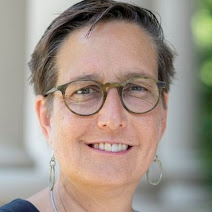The following class meeting was committed to a visit to our library's rare books room; we have a small collection, useful for teaching, of manuscript leaves and early printed books that really helpful to have in conjunction with digital reproductions on Early English Books on Line and the British Library.
But for the next week, I wrote a lecture. After 25 years in the classroom, I usually write an outline, not a lecture. But this one, I needed to get right. Here's a portion of my comments to the class.
==============
I have long had a policy of not talking directly about politics in class. But right now, we're in a situation where what is going on is too important not to talk about. Also, I have tenure, so I can talk about politics. Therefore, it seems to me, in the current situation, I must.
The new administration has removed information on a wide variety of topics from the White House website. The presidential website of the previous administration (archived here, but no longer live) includes sections on civil rights, climate change, education, health care, immigration, disabilities, ethics, equal pay, veterans, and women's issues.
The current site has eliminated all of these sections, leaving references only to energy, foreign policy, jobs and trade, law enforcement, and a strong military (but not veterans).
Meanwhile, the new regime has instructed officials at the National Parks, the Department of Transportation, the Environmental Protection Agency, the Department of Agriculture, the National Institutes of Health, and several other federal organizations to freeze communications: no press releases, no peer-reviewed publications, no tweets, no blog posts, until new policies governing the release of information can be put in place.
That has not happened yet.
Meanwhile, National Parks employees who tweeted climate data were forced to delete those tweets, leading to the creation of rogue accounts like @BadHombreNPS and @AltUSNatParkService. These might be run by parks employees; no one is sure.
The day after the inauguration, Trump’s press secretary went on the news and insisted that the crowds attending the inauguration were “the largest ever” despite aerial photos, Metro statistics about numbers of riders, and police estimates suggesting it wasn’t true. Trump has long been tweeting pretty much whatever he feels like, with little regard for the truth.
Most recently, Trump issued an executive order banning Muslim (but not Christian) people from certain countries from entering the US, even if they held green cards. The US Attorney General, Sally Q. Yates, called this unconstitutional and issued a stay of the order, and Trump fired her.
Trump’s attack on truth is comparable to what has been done under previous totalitarian regimes. A totalitarian government is centralized, controls the flow of information, allows no dissent or criticism of the people in power. Trump’s attempts to discredit legitimate journalism and science are comparable to efforts in other totalitarian regimes of the past to silence anyone with dissenting views.
Trump has appointed Steve Bannon to the National Security Council, a move without precedent but one that gives significant power to the head of Breitbart News, a corporation dedicated to expressing rage against women, people of color, and non-Christians.
Hitler was appointed Chancellor in January and appointed Joseph Goebbels to institute a massive propaganda campaign. In May, across the country, people went into bookstores and libraries and took out books deemed "un-German" -- written by foreigners, Jews, liberals, pacifists -- and burned them.
As I wrote in my last post, teaching just got a lot harder. And teaching students to be critical consumers of on-line information just got a lot more crucial.




